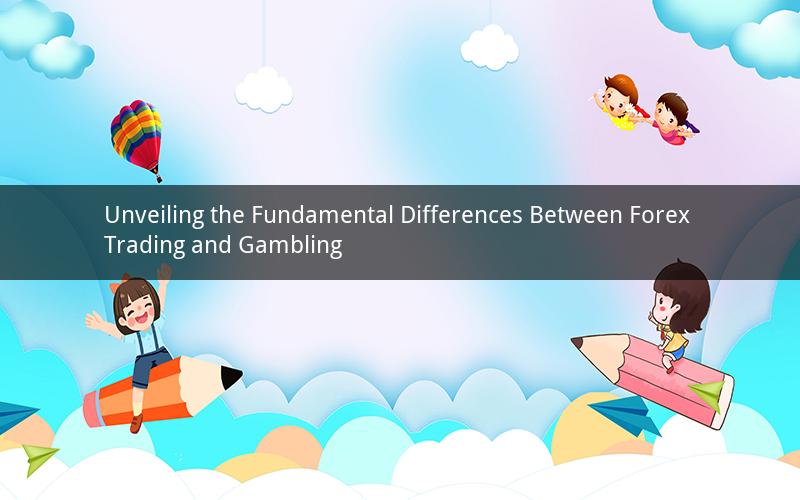
Introduction:
When it comes to the world of finance, two activities often draw comparisons: forex trading and gambling. Both involve risk, potential rewards, and a certain level of skill or luck. However, despite their similarities, there are significant differences between the two that are crucial to understand. In this article, we will explore the main differences between forex trading and gambling, shedding light on why one is a legitimate financial endeavor while the other is considered a form of entertainment.
1. Objective and Purpose:
Forex trading is primarily driven by the objective of making a profit through the buying and selling of currencies. Traders analyze market trends, economic indicators, and geopolitical events to make informed decisions and predict future price movements. On the other hand, gambling is driven by the desire to win money with little to no emphasis on skill or strategy. Gamblers often rely on luck or chance to win, with no long-term goal beyond entertainment.
2. Skill vs. Luck:
In forex trading, skill plays a significant role in achieving success. Traders must possess a strong understanding of market analysis, technical and fundamental analysis, risk management, and money management techniques. By leveraging their knowledge and expertise, traders aim to gain an edge over the market. Conversely, gambling is often seen as a game of luck, where the outcome is heavily reliant on chance. While some strategies may exist, they usually have a limited impact on the outcome, making luck the predominant factor.
3. Risk Management:
One of the fundamental differences between forex trading and gambling is the emphasis on risk management. In forex trading, traders employ risk management techniques to mitigate potential losses. This includes setting stop-loss orders, diversifying their portfolio, and adhering to a strict money management strategy. In gambling, risk management is often overlooked, with gamblers sometimes betting beyond their means and without a clear plan for potential losses.
4. Market Regulation:
Forex trading operates within a regulated framework, ensuring fair and transparent market conditions. Regulatory bodies, such as the National Futures Association (NFA) in the United States and the Financial Conduct Authority (FCA) in the UK, oversee forex trading activities to protect investors and maintain market integrity. In contrast, gambling is generally unregulated, with different jurisdictions having varying regulations. This lack of regulation can lead to unfair practices and a higher risk of fraud.
5. Long-Term vs. Short-Term Focus:
Forex trading is often characterized by its long-term perspective. Traders may hold positions for days, weeks, or even months, aiming to capitalize on long-term market trends. This requires patience, discipline, and a focus on long-term goals. In gambling, the focus is typically short-term, with gamblers seeking immediate gratification or quick wins. The absence of a long-term strategy can lead to impulsive decision-making and potential financial disaster.
5 Related Questions and Answers:
1. Question: Can a person become rich through forex trading?
Answer: Yes, it is possible for individuals to become rich through forex trading, but it requires a combination of skill, discipline, and perseverance. Success in forex trading is not guaranteed, and it is essential to have a solid understanding of the market and risk management techniques.
2. Question: Is gambling a reliable way to make money?
Answer: No, gambling is not a reliable way to make money. While there is a chance of winning, the odds are typically stacked against the gambler. It is important to view gambling as a form of entertainment and not a source of income.
3. Question: Can one use the same strategies for forex trading and gambling?
Answer: No, the strategies used in forex trading and gambling differ significantly. While some general principles may apply, the objectives, risk tolerance, and skill requirements are vastly different. It is crucial to tailor strategies to the specific nature of each activity.
4. Question: Is it possible to transition from gambling to forex trading?
Answer: Yes, it is possible to transition from gambling to forex trading, but it requires a shift in mindset and the acquisition of new skills. Individuals who have experience with gambling may have an understanding of risk and chance, but they will need to learn about market analysis, technical and fundamental analysis, and risk management techniques to succeed in forex trading.
5. Question: What are the risks involved in forex trading?
Answer: The risks involved in forex trading include market volatility, leverage, and the potential for significant losses. Traders must understand the risks associated with forex trading and implement proper risk management techniques to protect their capital.
Conclusion:
In conclusion, while forex trading and gambling share certain similarities, such as the potential for financial gain and the element of risk, they differ significantly in their objectives, approach, and skill requirements. Understanding these differences is crucial for individuals looking to engage in either activity, as it can help them make informed decisions and minimize potential losses. Whether pursuing forex trading as a legitimate financial endeavor or engaging in gambling for entertainment, it is essential to approach it with the right mindset and a clear understanding of the associated risks.